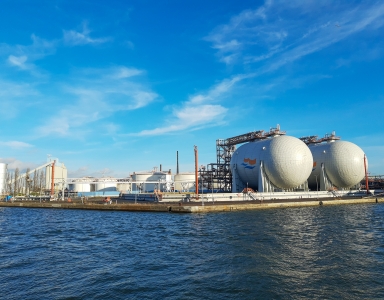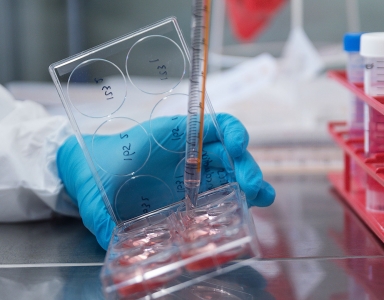Shell, TU Delft & partners – MELODY
The energy transition requires solutions for the decentralized storage of solar and wind energy and the balancing of fluctuating production capacity. Redox flow batteries (RFB) Redox flow batteries (RFB) represent one class of energy storage devices in which electrical energy is stored in liquid chemical compounds. The name “redox” refers to chemical reduction and oxidation reactions employed in this battery. This enables energy storage in solutions which flow through a stack of electrochemical cells during charge and discharge. are considered prime candidates for grid-scale stationary energy storage due to their ability to store large amounts of electrical energy for extended periods and release it quickly when needed.
However, currently used RFB rely on redox couples that are non-indigenous to Europe, not widely available and therefore relatively costly. Furthermore, mass market introduction of RFB’s has been hampered by various technical constraints. Hence, the development of an economically viable, environmentally benign and sustainable redox flow battery storage systems is therefore eagerly awaited.
Consortium of SME’s, academics and industrial partners
To successfully complete all objectives as set out in the call, MELODY brings together a world-class consortium of SMEs (Elestor, PV3 Technologies, Vertech), industry (Shell) and academic leaders (TU Delft, Technion, University of Exeter, ETH Zurich) with all the required know-how and capabilities to complete the project.
Redox Flow Batteries & Energy Transition
The MEmbraneless LOw cost high DensitY RFB (MELODY) consortium will develop a revolutionary hydrogen bromine flow battery. The technology that will be developed within the project will result in an unprecedented next step in low cost electricity storage at scale. The storage systems will be designed for large scale stationary applications, whereby the storage costs per kWh are impressively low, as lined out in het in the Strategic Energy Technology plan (SET plan).
Successful application | Hezelburcht & MELODY project partners
The MELODY project has been rewarded with a grant from the European Horizon 2020 programme. The proposal was in response to the call named ‘Advanced Redox Flow Batteries for stationary energy storage’.
Hezelburcht has written the application in collaboration with the project partners. Hezelburcht was responsible for the project management and coordination during the writing and submission phase and helped the consortium by reviewing the proposal to increase the quality of the grant proposal.
Our team had the opportunity to work together with Hezelburcht while preparing the proposal for the MELODY (MEmbraneless LOw cost high DensitY RFB) project, which was submitted in response to the EU ‘Advanced Redox Flow Batteries for stationary energy storage’ call. Aimed at the development of a next-generation redox-flow battery, the project brought together academic and industrial partners to develop an innovative membraneless redox flow battery technology. With input from all project partners, Hezelburcht played a key role in shaping the proposal. Through excellent coordination, by facilitating regular meetings with all project partners, and by tapping into a considerable experience in writing strong project proposals, Hezelburcht made easy work of a complex proposal that led to a successful application and grant award through the EU Horizon 2020 Framework Programme. We are grateful to Bram van Weerdenburg and Colin Hissink from Hezelburcht for their dedication to this project and for their expert advice. - Dr. Diana Westerwaal, lead MELODY project, Shell



